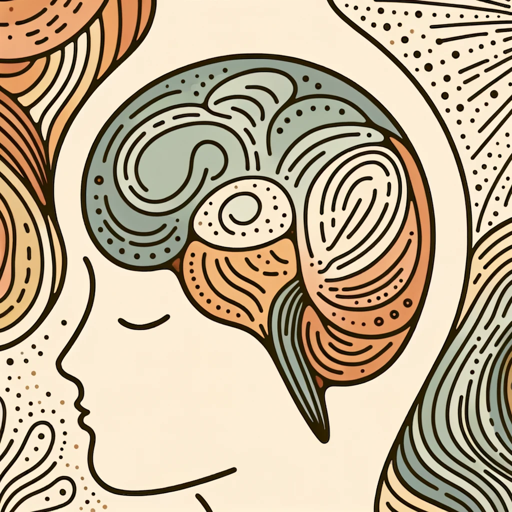Depression-AI-driven depression support tool
AI-powered support for depression
What are the symptoms of depression?
How can I cope with depression?
Can you tell me about depression treatments?
What should I do if I think I'm depressed?
Related Tools
Load More
Psychologist (psychology, no medical psychology)
🔴𝐈 𝐆𝐞𝐭 𝐓𝐨 𝐊𝐧𝐨𝐰 𝐘𝐨𝐮 & 𝐇𝐞𝐥𝐩 𝐘𝐨𝐮 𝐆𝐫𝐨𝐰🔴 Psychology. No tailored medical advice.
Anxiety Coach ❤️🔥
Recognize, manage, cope. Works well with GPT-Voice.
PsyMedAssist+
IA especializada em psiquiatria para suporte a psiquiatras

AI Psychologist Mental-Health
Professional AI psychologist, relationships, soft skills. I can help you

Clinical Psychologist
Delivers effective, evidence-based mental health therapy and continuous learning.

Mr Psych
Expert in psychology, adept at explaining concepts to diverse age groups.
20.0 / 5 (200 votes)
Introduction to Depression
Depression is an AI-based conversational tool designed to provide information and guidance on managing depression and related mental health concerns. Its purpose is to offer support through detailed insights into the signs and symptoms of depression, coping strategies, and general advice on maintaining mental well-being. This tool is not a substitute for professional medical advice but serves as a supplementary resource to help individuals understand and cope with depression. For instance, a user experiencing symptoms of depression might seek guidance on lifestyle adjustments or inquire about the differences between clinical depression and general sadness.

Primary Functions of Depression
Identifying Symptoms
Example
A user describing prolonged feelings of sadness, loss of interest in activities, or changes in sleep patterns can receive information about whether these are common symptoms of depression.
Scenario
An individual concerned about their emotional health reaches out, detailing their recent mood changes and seeking to understand if they align with depressive symptoms. The tool provides insights into these symptoms, helping the user gauge whether they should consult a healthcare provider.
Coping Strategies
Example
When a user reports feeling overwhelmed by stress or anxiety, the tool can suggest coping mechanisms such as mindfulness, regular exercise, or social support.
Scenario
A student facing exam stress and exhibiting signs of anxiety and mood swings seeks advice on managing their mental health during this period. The tool offers tailored coping strategies to reduce stress and enhance focus.
Information on Treatment Options
Example
A user curious about therapy types and medication options for depression can receive an overview of available treatments.
Scenario
Someone recently diagnosed with depression wants to learn more about cognitive-behavioral therapy (CBT) and antidepressants. The tool provides an overview of these treatment methods, how they work, and their effectiveness in managing depression.
Target Users of Depression Services
Individuals Experiencing Symptoms
This group includes people who are experiencing symptoms of depression but are unsure about seeking professional help. They may benefit from initial information and reassurance, which can encourage them to seek further assistance if necessary.
Caregivers and Supporters
Family members or friends of individuals struggling with depression who are seeking ways to support their loved ones can gain insight into how depression affects individuals and what they can do to help. This empowers them to provide informed support and encouragement.

Guidelines for Using Depression
Visit aichatonline.org for a free trial without login, also no need for ChatGPT Plus.
Start by accessing the platform to explore its features without requiring an account or premium subscription. This ensures you can experience the tool freely and easily.
Understand Your Use Case
Identify your specific needs, whether it's for mental health support, information, or advice. Clarifying your objective will help you make the most out of the tool.
Interact Naturally
Engage with the tool by asking questions or describing your situation. The more specific and detailed your input, the more relevant and personalized the response will be.
Review and Apply Advice
Carefully read through the responses, taking note of any advice, resources, or coping strategies provided. Apply these insights as appropriate to your situation.
Continue Learning and Exploring
Regularly revisit the tool to deepen your understanding and discover new information or coping strategies. Consistent engagement will enhance your experience and outcomes.
Try other advanced and practical GPTs
Columnist Henry-专栏作家亨利
AI-powered columnist linking past and present.

MEV Sandwich Engineer
AI-Powered Ethereum MEV Bot Guidance

NewsEditorAI
AI-powered tool for professional news creation.

Plagarism Remover
AI-Powered Text Rephrasing Tool

Watermark Remover
AI-Powered Watermark Removal Tool

Remove Background From Photo
AI-powered image background removal tool.

Heat Map Insights
AI-powered heat maps for smarter engagement.

Prompt Artist
AI-powered prompts for creative minds.

NetSketch Artist
Transform ideas into visuals with AI.

Image Artist
AI-powered creativity and art support

Design Sequence Diagram & Implement
AI-powered software design and implementation.

Fix My Computer
AI-Powered Computer Troubleshooting

- Research
- Education
- Support
- Mental Health
- Awareness
Common Questions About Using Depression
What can I ask this tool about depression?
You can ask about symptoms, coping strategies, treatment options, and how to support others. The tool is designed to provide detailed, empathetic responses to a wide range of depression-related queries.
How accurate is the information provided?
The tool offers information based on well-established mental health guidelines and knowledge. While it provides useful insights, it should not replace professional medical advice.
Can this tool help in emergency situations?
While the tool can offer support and information, it is not equipped to handle emergencies. In case of a crisis, it is crucial to seek immediate help from a medical professional or emergency services.
How does this tool personalize responses?
The tool tailors its responses based on the specificity and detail of your queries. By understanding your context, it can provide more relevant and helpful information.
Can I use this tool for academic purposes?
Yes, the tool can assist in academic research or writing on mental health topics, offering insights and data on depression that can enhance your work.